MCBees Help Provide Student Support, Recruit, & Share the Joy of Science
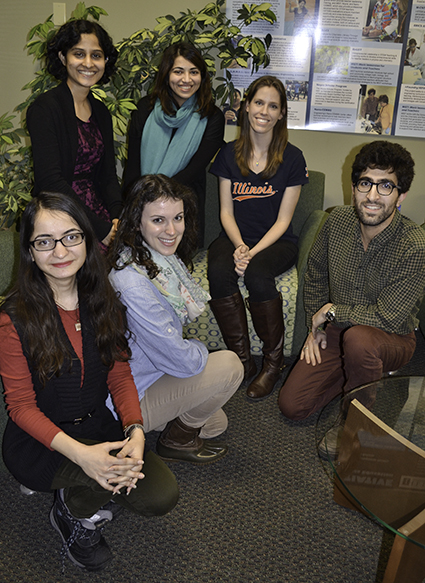
Several members of the MCBees leadership team (clockwise from the lower left): Maryam Khademian, Amruta Bhate, Nayab Abidi, Kirsten Eckstrum, Omid Gholamalamdari, Mara Livezey
April 26, 2016
In the past, new graduate students coming into Illinois' 10-year-old School of Molecular and Cellular Biology (MCB) didn’t have much interaction with other grad students who had been in MCB for a while. During their first six months at Illinois, they were somewhat isolated as they rotated from lab to lab to find their niche, then got further divided as they entered one of MCB’s four departments: Biochemistry, Cell and Developmental Biology, Microbiology, and Molecular and Integrative Physiology (MIP). Then, once that first semester was done, they didn’t really come into contact with their classmates any more, “because you kind of get busy with your work," admits Biochemistry grad student Amruta Bhate, "and you only meet people from your department."
So a group of MCB grad students decided to do something about it. They got together and started a GSA (Graduate Student Association). They call themselves the MCBees. Their goals? To become a source of support for graduate students, especially incoming first-year students; to help MCB with recruitment; to foster relationship-building among grad students via social activities; and to do outreach.
Microbiology grad student Maryam Khademian came up with the idea for the group when comparing MCB's somewhat isolated environment to the sense of family she had experienced during her undergrad years.
“That was an amazing experience…a very friendly group of people where everybody helped each other,” she says. “We got support from each other.” She claims that as an undergrad, she got to know a great network of people who are “still my great, great friends.” So she decided that it could be the same in MCB:
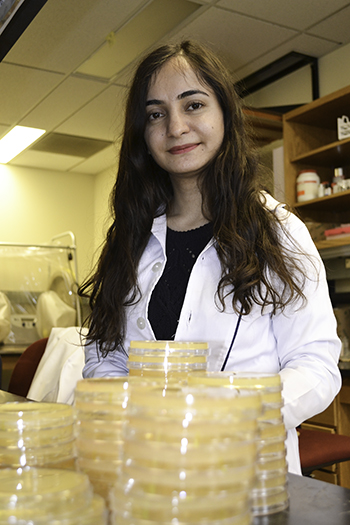
Maryam Khademian, MCBees President
“Well, we have like 250 students here who are all potential friends,” she thought to herself. “Grad school can be just as fun, and as cool, and as amazing as my undergrad experiences if we help students to know each other and to make friends.”
So at their first meeting in November, 2015, they picked the leadership, working to ensure that all the departments were represented. In January of 2016, once they became an officially registered GSA, they started recruiting MCB grad students via email. So far, around 100 of MCB’s 250 students have become members. Following are the MCBees' leadership team members, their roles/responsibilities, and their departments:
- Maryam Khademian, President, Microbiology Department
- Prita Rao, Secretary, Microbiology Department
- Omid Gholamalamdari, Treasurer, Cell and Developmental Biology Department
- Michelle Goettge, Communications, Microbiology Department
- Amruta Bhate, Academic, Biochemistry Department
- Nayab Abidi, First-Year Liaison, Cell and Developmental Biology Department
- Kirsten Eckstrum, Social, MIP Department
- Mara Livezey, Outreach, Biochemistry Department
Biochemistry's Amruta Bhate isn’t worried by the number of students who have joined so far; she knows that it might take students a while:
“I have realized that doing something like this does take a bit of your time away from your lab, and not everybody wants to do it. But I still think it’s something that you should do because there is something apart from just going to lab and working the lab. But I took four years to realize that.”
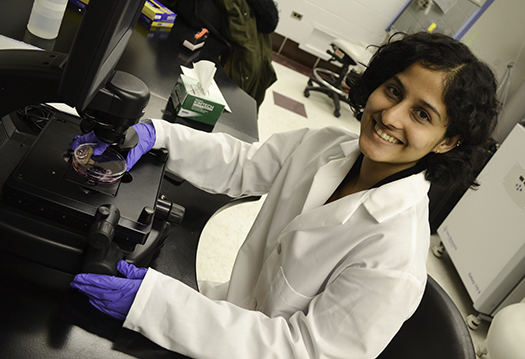
Amruta Bhate at work in her lab in the Medical Sciences Building, studying how the mechanism called "alternative mRNA splicing," which enables cells to make different proteins from the same mRNA, impacts liver maturation and regeneration.
One of the MCBees main goals is “to be a platform of support for grad students, where they feel that they are at home and get to know each other and make friends,” says president and founder Khademian.
She hopes the MCBees will become a family—friends that will, for instance, supply the affirmation and recognition that is often missing: “We will appreciate each other, because nobody actually recognizes the grad students who did that. It’s like four years you have been spending time on this; now the paper is out, and it’s in your advisor’s name.”
And as with her undergraduate friends, she hopes they all become life-long friends—“bring that experience for their lives, not even just for the years that they are here. They gain something that they can actually take throughout their lives.”
The MCBees leadership team members also especially hope to foster networking across MCB departments. Amruta Bhate, over the Academics committee, says “So there isn’t a lot of holistic communication between grad students between different departments. That is why we felt we should have a grad student association where we can come together and network.”
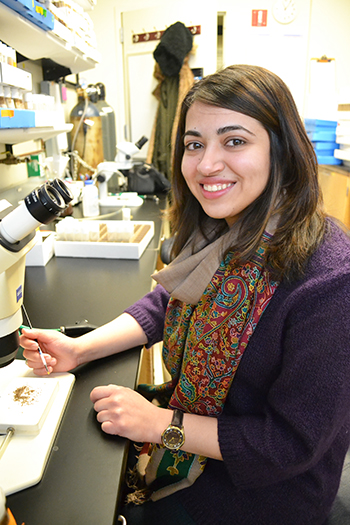
Nayab Abidi in her lab in CLSL. Her work involves using fruit flies as a model organism to study wound repair and tissue regeneration. Her research seeks to search for and identify genes that play an important role in the process of regeneration.
The MCBees also hope to do more than just network. They have big plans for the future: academic events, drawing clubs, journal clubs, science-based competitions, social hours, outreach. Bhate adds that they also hope to: “have an early source where the incoming grad students can just contact senior students just to know how this school works.”
Remembering how lost they all felt in their first year in MCB, this idea of fostering communication and mentoring between those who have been in MCB for a while and new grad students is another key MCBees goal. According to the head of the First Year Liaison Committee, Nayab Abidi, “Senior students weren’t communicating with the junior ones. New batches would come in; you wouldn’t have any idea who the new students were, and new students wouldn’t be able to ask for any guidance or help from the senior ones because there wasn’t any means of talking with each other.” So the MCBees formed a GSA to help resolve this dilemma.
There’s another void the MCBees hope to fill: “We’re working on recruitment,” explains Kirsten Eckstrum, head of the Social Committee. For instance when prospective students visited campus earlier this semester to interview with faculty, they also met with the MCBees, who held a social hour which included a game to help potential recruits “learn a little bit more about graduate life here and about Champaign-Urbana.”
First-Year Liaison Committee Chair Abidi reports hearing a coordinator say that recruitment week hadn’t been having “enough interaction between the grad students who were here and the new ones that are coming in. So this event specifically is meant to further the interaction between the incoming students and the ones that are already here.”
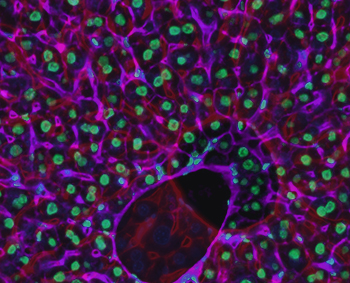
Above and below are the winners of the Research Photo Contest: The image above,"Lack of ESRP2 hinders proper maturation of hepatocytes," by Amruta Bhate.
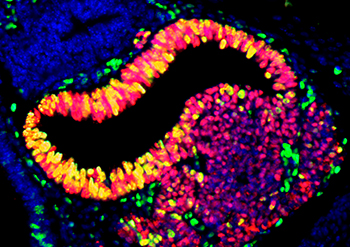
This image entitled, "The Pituitary is the Master Gland. Our Gland Tells your Glands what to do," by Whitney Edwards is an embryonic mouse pituitary that has been double-stained with a marker of progenitor cells and a marker of cellular proliferation. (Image courtesy of Whitney Edwards.)
“If you decide to come to the U of I for your PhD,” adds Bhate, “essentially you are committing five years of your life, at least, so you want to get a feel of this school, and we are trying to give them that.”
For prospective students who couldn’t make the first visit in Februrary, MCB scheduled an alternate weekend in mid-March. For that event, the MCBees sponsored the MCB Rapid Fire competition in the form of elevator speeches. Labs or grad students had three minutes to present their research to the audience.
“It’s like an elevator pitch, but in a fun way,” explains Bhate. “To be catchy, it has to be general so that people from every discipline can understand it, and it has to be short, and sweet, and funny.” While still a competition, the plan was that “the candidates/recruits will get an idea of the breadth of research going on.”
The MCBees also did another fun, research-related event for MCB recruiting week: a research photo contest. They had students send them photos related to their research with a description, which they printed then showcased during the recruitment weeks, “so recruits would actually see what’s going on,” explains Khademian. “They see what research actually is like.”
“These are actual research images, actual data from somebody’s lab, but they are also visually appealing,” adds Bhate. “So you’ll have a cool image that’s also actual raw data. It has both things going for it.”
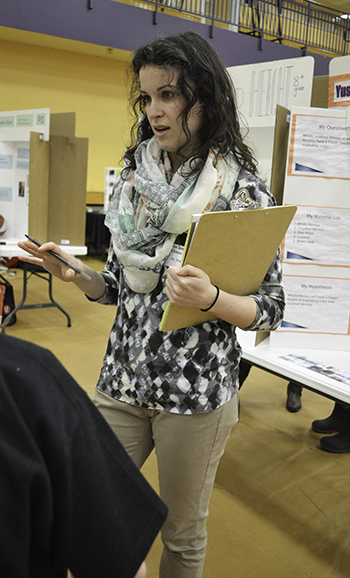
Passionate about outreach, the MCBees Outreach Coordinator Mara Livezey recently headed out into the community to Next Generation School's Science and Engineering Fair to serve as a judge. Here she is chatting with a student whose project she is judging.
What were some other fun events they did as part of their recruitment week activities? They collaborated with the grad college to show the PhD movie, and held “a happy hour for all the grad students in MCB as well as for the new recruits” says Kirstin Eckstrum, in charge of social activities.
Another emphasis of the MCBees is outreach. According to Outreach Coordinator Mara Livezey, “We all do science; we all love science. But for one reason or another, we got into science because someone taught it to us, and I feel like we have to go out into the community and teach others because, how else can they be exposed to it really?”
In fact, one outreach idea the MCBees have is to perfect the Elevator Speeches highlighting their research that they did for the March recruiting weekend, making them for general audiences.
Omid Gholamalamdari, the MCBees’ Treasurer, explains that they borrowed the idea from the Graduate College’s Research Live! competition held for the public, during which Illinois grad students were given three minutes to talk about their research.
“So this can be a kind of outreach someday if we just plan it for a public audience,” he explains.
Maryam adds that doing “Elevator Speeches” for the February recruiting weekend was kind of a test run; the plan was to “do it on a smaller scale just to work out the nitty gritty details of the event, and then we’ll eventually go big.”
Omid even wants to do an outreach to tackle the apprehension the general public often feels about research.
“We were thinking of just asking MCB faculty to come and talk about the science that they’re doing in their lab so people will get what the scientists are doing here and what’s the real impact on the world. Because there’s a huge gap between the normal audience and the scientists; they have no idea what is going on inside the labs. The best way to fill it is to ask the faculty to come and talk about what they are doing exactly.
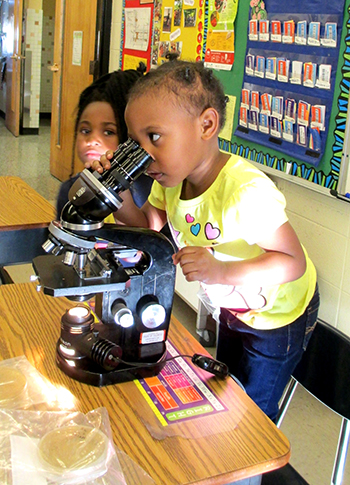
A local youngster gets to see live cells moving through a microscope during Dr. Williams Elementary's STEM Night (photo courtesy Mara Livezey).
The MCBees also recently participated in Dr. Williams Elementary's STEM Night on April 14th, doing two interactive activities for students in grades 1-5. They taught the youngsters about the different parts that make up human cells, and had the students extract DNA from strawberries. In addition, they set up a microscope so the students could see live cells moving.
The MCBees have other big plans for the future:
For one, they hope to collaborate or interact with other organizations or different departments on campus, not just in MCB. In the past, MCB didn’t have any organization to do that; now they do.
Abidi would also like to take it a step further: to foster multidisciplinary research collaboration: “We don’t interact a lot with other departments like, say physics or engineering…We could use this as a platform to interact with other disciplines. One of the great things about Illinois is what a multidisciplinary campus this is, so we can really benefit from the other departments. Who knows? Maybe we can set up different collaborations or team labs just by talking to different people that you might not know. The work that they’re doing could be beneficial for what you’re doing in your lab.”
The committee has also discussed starting a book club or journal club. While they haven’t ironed out the details, the idea is that if “Something really cool comes up, we have a journal club or somebody presents the coolest thing out there and then people are made aware of this. Or read a book about a scientist, get more of an idea about how they went about it so students can draw inspiration out of it.”
The MCBees leadership team’s hopes for their GSA are pretty much related to the goals of the individual committees they chair. For instance, while Mara Livezey says, “I hope for the graduate students that as a group, we can bring everyone together and form more of a community within MCB,” of course, her hopes are also related to outreach:
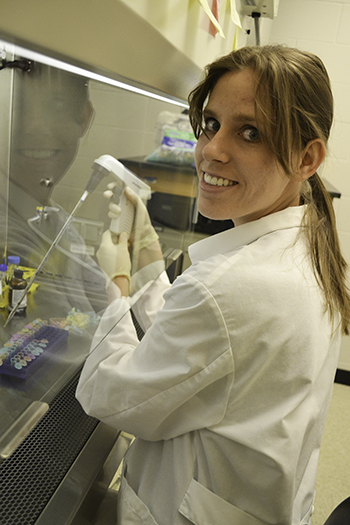
Kirsten Eckstrum, Chair of the Social Committee, Department of MIB.
“For younger people or people not within the university, I just hope we can spread the word of science and get some excitement about what we do every day.”
Nayab Abidi’s hopes are, of course, related to the first-year students: “Once we got separated into departments, even though we all were the same year, we had zero interaction with each other. Like we’re the same department; we’re the same school, and the same batch, and we still don’t interact with each other. So I felt like that was one of the biggest lackings in MCB; that there wasn't much interaction with people you were so close to the first 6 months you were here." So I guess that would be one of the main things—have more interaction.”
Abidi is also passionate about the mentoring aspect: “The first years, when you first come in, you don’t have a lot of guidance by senior grad students. So that would be another thing we would be able to help remedy. When the grad students are coming in, they have more interaction. They’ll be able to get into the MCB community easier.”
Kirsten Eckstrum’s purview is social activities, and she hopes the MCBees provide that for students:
“I hope that we set up a way for everyone to have fun, because we know that grad school is not always fun. It can be very frustrating and draining on you. So I want to set up something where we can all get together and have fun and get to know people from other departments so we’re not so alone, so that we can know that other people are going through the same things we are and having the same struggles that we are having in grad school.”
Nayab echoes what was said about the struggle of grad school. "A lot of the time, somehow a grad student's effort is not being highlighted…This is where we could act as a really good support system for each other also. I think that is where the MCB GSA is going to be really important as well, acting as a support system for all the grad students."
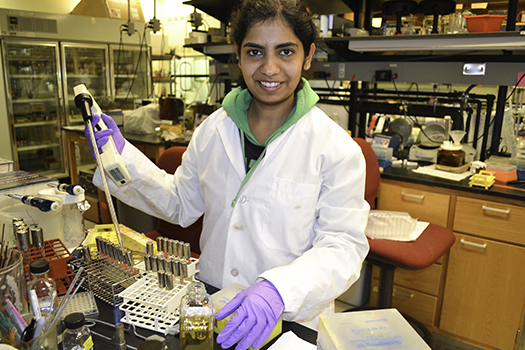
Pritha Rao at work in her lab in the Chemical and Life Sciences Laborabory.
Pritaha Rao, the MCBees's Secretary, indicates why she got involved in the MCBees: "This was a group dedicated to represent the graduate students in MCB program. I thought this was a good opportunity to interact with people from the department outside the classroom setting and meet as individuals who are interested in various cultural, academic and outreach activities so that we would all have something other than our research to look forward to during graduate school."
Although the MCBees have only been in existence for a few months, Rao believes the group has begun to have an impact: "We have already organized a couple of events highlighting our research and an outreach event with kids from elementary school. I can say that these events have helped graduate students, including me, realize the importance of the work we do, think of simpler ways to describe the complicated science we do. It has also been immensely satisfying to be able to reach out to the community and help them with our expertise."
Rao hopes the MCBees will become "a support system for the graduate students, to address the issues they face during their time in graduate school, as well as give them opportunities to enhance their graduate career."
Bhate hopes the MCBees serves to disseminate information about the research going on in MCB:
“We hope to broadcast what we do here at UIUC in these departments to other people who are not related to UIUC, like schools…The other thing is also have a platform where we can broadcast what the grad students are doing. We are trying to have something set up if somebody publishes a paper, we highlight that. Something like that so there is recognition, so grad students also feel appreciated.”
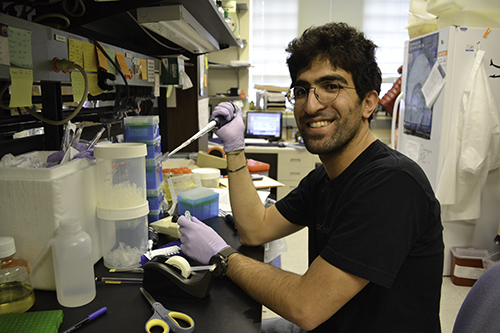
Omid Gholamalamdari, Treasurer, Cell and Developmental Biology Department
Amruta also believes the MCBees can benefit not just first-year students, but a specific subgroup: international students: “I think this would also be a good resource because you are coming into a completely different setup, so you kind of need somebody to help you navigate through that…That is going to be very important for the first year students and maybe moreso for the international students.”
Unlike the other MCBees, Omid Gholamalamdari isn’t necessarily passionate about his position of treasurer; he accepted the role to meet a need: “We had an empty position that nobody wanted and that was the treasurer,” he admits, “so that was how I wanted to help the MCBees to get us started.” However, he is passionate about the group’s outreach:
“I really like discovering things and learning about things,” he admits. “There is just a joy in that, and it’s great to share that joy with other people. I like the outreach part of MCBees the most because it’s just sharing the joy with other people.”
More: Biology, 6-8 Outreach, MCBees, 2016
Story and photographs by Elizabeth Innes, Communications Specialist, I-STEM Education Initiative.













.jpg)
















